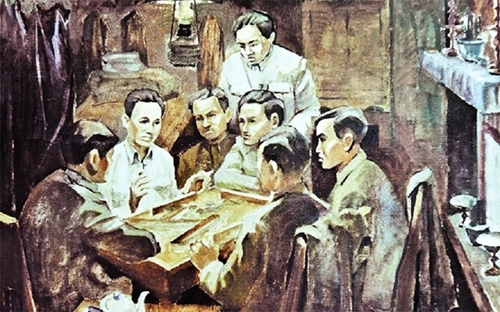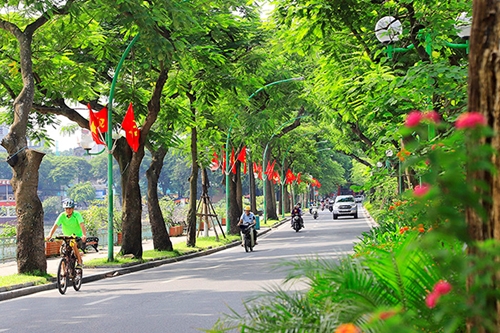At the end of the 19th century, after capturing Vietnam, the French colonialists imposed harsh and brutal policies to exploit the colony, leading to various patriotic uprisings and movements for national salvation. Typical among them are the Can Vuong (Support for the King) and Dong Du (Journey to the East) movements, the reform movement waged by Phan Chau Trinh, and Yen The uprising.
Despite the fact that the movements drew the ardent participation of patriots, they all failed to liberate the nation and were bloodily suppressed by the French colonialists. That failure was due to the lack of a right path to national salvation and a leading organization capable of gathering the masses and tap the synergy of the entire nation.
    |
 |
|
Representatives of the three communist organizations met in Hong Kong. (Photo: Nhan dan) |
In that context, in June 1911, Nguyen Tat Thanh (an alias of Ho Chi Minh), a patriotic young man, left Nha Rong Wharf to find a way to salvage his country and overthrow the colonial yoke.
In 1920, Nguyen Ai Quoc (another alias of Nguyen Tat Thanh) found Marxism-Leninism. The ideology helped Nguyen Ai Quoc come to realize the fact that in order to salvage a nation, there must be a revolutionary political party capable of mobilizing and organizing the masses internally and externally. The political party serves as a steering wheel for the boat to sail forcefully. Based on that reality, from 1921 to 1929, Nguyen Ai Quoc made every effort to prepare for the establishment of a proletarian political party in Vietnam.
The Vietnam Revolutionary Youth League was, therefore, founded by Nguyen Ai Quoc. Deeply imbued with Marxism-Leninism, the league contributed to push up the anti-colonialism revolutionary movement in Vietnam, leading to the establishment of three communist organizations in North, Central, and South Vietnam.
The birth of the three communist organizations in a short period of time reflected the inevitable trend of the revolutionary movement in Vietnam. However, the operation of those three separate organizations ran the risk of major division among revolutionary forces in the country, urgently requiring the three organizations to merge into one unified political party.
As a result, from February 3 to 7, 1930, representatives of the three organizations met in Hong Kong. Under the chair of Nguyen Ai Quoc, they agreed to merge into one unified organization and name the organization “the Communist Party of Vietnam” (CPV).
The CPV then approved the brief political party platform, the brief political strategy, and brief political program and statute drafted by Nguyen Ai Quoc. Participants at the meeting also approved the “Appeal” to workers, peasants, soldiers, youths, students, and all compatriots under oppression. The appeal was prepared by Nguyen Ai Quoc on behalf of the Comintern and the Communist Party of Vietnam to call on people of all walks of life who were oppressed by the colonialists to stand up and fight for independence. Those were the first important documents of the CPV and February 3, 1930 was chosen to be the founding day of the CPV.
    |
|
|
 Birth of CPV marks the dawn of the nation’s development. (Photo: hanoi.gov.vn) Birth of CPV marks the dawn of the nation’s development. (Photo: hanoi.gov.vn) |
Over the past 92 years, under the leadership of the CPV, the Vietnamese people have stood up against foreign invaders and won various victories, from the August Revolution in 1945 to the establishment of the first worker-peasant state in Southeast Asia – the Democratic Republic of Vietnam, the victory of the resistance war against the French colonialists, and the final victory in the resistance war against the U.S. imperialists and national reunification in 1975.
After the advent of “Doi moi” (renewal) in 1986, the CPV and the whole nation is now on the path to stronger development. For more than 35 years of renewal, under the leadership of the CPV, Vietnam has made historic achievements on the road to socialism and Fatherland safeguarding, contributing to peace, national independence, peace and socialism in the world.
The above achievements serve as an important premise for Vietnam to continue to develop in the coming years. They have also shown to the world that the guideline of the CPV is absolutely right and in line with reality and specific conditions of Vietnam and the development of times. On that basis, Vietnam can continue to embark firmly on the path to socialism.
From those victories in both wartime and peacetime, it can be seen that the CPV is the only political party capable of realizing the goal of “wealthy people, powerful nation, democracy, justice, and civilization” as guided by President Ho Chi Minh.
Basing itself on the achievements made over the past 92 years, the CPV is now strongly renewing itself to deserve the trust of the people. The prestige of the CPV is high and the people are increasingly placing their confidence in its leadership. That is the basis for the whole CPV and the people of Vietnam to confidently reach for a bright future.
Translated by Huu Duong